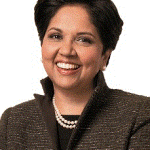Indra Nooyi’s Leadership Lessons: Head, Heart & Hands
PepsiCo’s CEO and Board Chairman personalizes business with a unique leadership point of view.
Put your whole self into the job: head, heart and hands.

Indra Nooyi
Chairman & CEO
PepsiCo, Inc.
Among the influential leaders named to the annual ranking of America’s leading business women, Indra Nooyi claimed the top spot for the fifth straight year in Fortune magazine’s list of 50 Most Powerful Women in Business.
Her innovative leadership philosophy has been at the heart of her power and influence, and has driven growth at PepsiCo even during challenging economic times. Named CEO in 2006 and Chairman of the Board of Directors in 2007, she helms PepsiCo, a world leader in convenient snacks, foods and beverages with revenues of more than $60 billion and more than 285,000 employees. The company boasts brands that stand for quality and include respected household names such as Gatorade®, Quaker Oats®, Tropicana®, Frito-Lay®, Pepsi-Cola and dozens more.
Indra shares her leadership lessons and conducts lectures, where tells why personalizing business is critical for success in today’s dynamic environment:
“The world is changing in profound ways. While the western world maintains a powerful status, the distance between developing nations is shrinking as other countries assume roles of increasing status. Power is emerging in nations where religion, language and governments differ vastly from traditional western beliefs. For the next two decades, aggressive growth will happen in geography that is quite alien to us. That means understanding the complexities of many parts of the world beyond Western Europe and the United States not just intellectually, but with head, heart and hands.
“This new world will be very different. Corporate governance must evolve to keep up with these geopolitical changes. We need leaders with very different mindsets. Gone are the days when companies were considered inanimate objects. Today’s CEOs must walk a mile in the shoes of their stakeholders. We need leaders with a global point of view, who develop public/private partnerships and make decisions based on how they impact society.
“The way we develop, recruit and train people will have to change radically. Success will be fueled by diverse talent, and there will be a war for that talent. Ultimately you have to think of diversity in many categories: ethnic, cultural, religious and generational. No part of society should be excluded from the potential talent pool. Bringing talent in is easy; developing and retaining it is difficult. The only way we will hold on to the best and brightest is to grasp them emotionally. No one may feel excluded. It’s our job to draw the best out of everyone. That means employees must be able to immerse their whole selves in a work environment in which they can develop their careers, families and philanthropy, and truly believe they are cared for.
“Companies must create return and value. At PepsiCo we keep in mind our role in society and know we are a force for good. We deliver performance with a sense of purpose in a way that offers great choice of products for consumers and leaves the environment as good as we found it, if not better.
“Sometimes corporate citizenship can sound like it’s an after-hours activity, but it’s important that people who come to work can feel like they bring their whole selves. In today’s often unsafe and unsustainable world, the only way we can make positive change is through economic prosperity. And that can be accomplished through responsible corporate citizenship and innovative partnerships between private enterprise and public entities.
“In 2010, PepsiCo made a promise that for the next ten years we will deliver sustainable growth by investing in a healthier future for our consumers, our planet, our associates, our external partners and the communities we serve. That promise is the cornerstone of our “Performance with Purpose” mission. While continuing to build a portfolio of foods and beverages, we are committed to finding innovative ways to reduce the use of energy, water and packaging while providing a great workplace for associates. In fact, we design our business plans to ensure that the work we do and the investments we make have a positive impact on society. We will respect, support and invest in the communities where we operate by hiring local people, creating products designed for local tastes and partnering with local farmers, governments and community groups. A healthier future for all people and our planet means a more successful future for PepsiCo. This is our promise.”
Life Lessons
Born in Madras, India, Indra spent her youth in southern India. “We were intellectually rich, but not monetarily,” says Indra. “We cared about a good education and working hard. Material benefits did not matter at all. Our house was huge but the furniture was sparse and old. The mentality was, ‘If you need a chair, sit on the floor.’ We never asked why, and we never asked for things because we understood that every penny went to education. A master’s degree was the ticket to being a member of our family.”
Her father and grandfather left strong impressions that shaped Indra’s future. “My grandfather insisted that we not be idle, even for ten minutes. He would say, ‘Read a book, and if you have read everything, re-read it to work on your English.’ He urged us to do our absolute best. He taught us to be reliable, deliver on promises and dream big. He would say, ‘If you are going to be the janitor, then position yourself as being in charge of the building’s hygiene and sanitation. Think about the bigger cause and contribute. Focus on your job today, not the next job. That next job will come if you do well.’
“My father always told me to assume positive intent. That meant, if someone said or did something that seemed bad or wrong, rather than getting mad, he would say, ‘Let’s think why he did that.’ He was sending me a strong message to consider different points of view. I struggled with the concept, but whenever I applied the lesson, I always came out ahead.
“When I was growing up, some of the lessons seemed tough, even punitive, but now looking back I see the lessons as unbelievably rich experiences.”
After earning an MBA from the Indian Institute of Management in Calcutta, Indra attended Yale School of Management in the US, earning a Master of Public and Private Management degree. In 1980, she started her career with Boston Consulting Group, and in 1986 joined Motorola as Vice President Corporate Planning and Strategy. Four years later, she accepted a position with Asian Brown Boveri as Vice President.
Indra launched her career with PepsiCo in 1994 as Senior Vice President, Strategic Planning and steadily rose through the company’s ranks. She was elected to the Board of Directors and became President and CFO in 2001 after serving as Senior Vice President and CFO. She has been PepsiCo’s Chief Executive Officer since 2006 and assumed the role of Chairman of PepsiCo’s Board of Directors in 2007.
Indra’s Eight Great Leadership Lessons
Drawing on her life lessons, Indra shares meaningful tips for leadership success:
- Take on a global perspective in everything you do.
- Look beyond your borders to understand the forces shaping the world.
- Read and study what is happening everywhere. Understanding a global history will give you a better context of the world.
- Put your whole self into the job: head, heart and hands.
- It’s critical to come into work every day prepared to do your absolute best. A leader must be hands on, not just involved intellectually. Empathize with and understand each person and tailor strategies to coach, shape and train the individual. I ask myself each day, Did I earn my return for the company? Did I make meaningful progress?
- Zoom out before you zoom in.
- Consider how your job impacts the people around you and how you are linked to other people and departments. You will address your job more realistically and richly.
- Do your job exceedingly well.
There is a meaningful speech by Dr. Martin Luther King, Jr., that I urge young people to read. In it, he says, “If a man is called to be a street sweeper, he should sweep streets even as Michelangelo painted, or Beethoven composed music, or Shakespeare wrote poetry. He should sweep streets so well that all the hosts of heaven and earth will pause to say, ‘Here lived a great street sweeper who did his job well.’”
Be politically aware, but don’t play politics.
Stay true to yourself and your company.
Invest in communication skills.
How you interact, write and speak are all very important. A brilliant person who can’t communicate cannot move an organization.
Nurture yourself as much as your job. In the quest for a career, don’t forget family, friends and faith.



